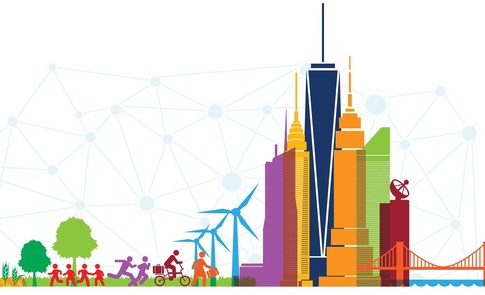P4G Partnerships Present Innovative Projects to Investors and Business and Political Leaders

Subject
P4G Summit
Publication Date
2018-09-20
About
P4G organizational partner World Economic Forum will host a P4G Green Growth Session as part of The Forum’s Sustainable Development Impact Summit in New York. P4G will connect members of its board and leaders within its network with three scale-up partnership finalists innovating towards green growth. The session will allow the P4G scale-up finalists to present their projects to investors and business leaders who will then pose solutions to the specific challenges each partnership is facing, while also encouraging all attendees to commit to action upon sustainable solutions in their unique positions as public and private sector leaders.
President and CEO of World Resources Institute Andrew Steer will facilitate the event. He will be joined by Dutch Minister for Development Ms. Sigrid Kaag and Danish State Secretary for Development Martin Hermann.
“P4G’s vision is one of highly collaborative change. In its aim of becoming the world’s leading forum for public-private partnerships delivering on the global goals, P4G is matching the best ideas with political and financial networks across the globe,” said Steer. “The featured partnerships at this Green Growth Session will be valuable case studies for how cross-sector action move change forward.”
Frank Rijsberman, Director-General of GGGI, Torben Moger Pedersen, CEO of PensionDenmark, and Dr. Julius Muia of the Kenya National Treasury will join the session as “Firestarter” leaders to extend first-hand experience with the opportunities and challenges in the green growth and sustainable development goal field. The firestarters will help both identify challenges for each partnership and direct discussion towards potential solutions.
PARTNERSHIPS:
SSEZ Africa
Introduced by Amy Jadesimi, Managing Director and CEO, LADOL
The Made in Africa Initiative, led by SYSTEMIQ and with support from UNDP, will integrate sustainability in the planning and operations of Special Economic Zones, with an initial focus on industrial parks in Ethiopia and Kenya. Through the institution of sustainable special economic zones (SSEZ), this partnership will focus on promoting human rights and curbing the environmental impact of industrial production, while aiming to extend economic growth and job creation beyond the enclave of the zone. Building upon previous successes in Nigeria, this partnership will promote sustainable energy and the reuse of water and waste.
AfricaGreenCo
Introduced by Ana Haiduka, CEO, Africa GreenCo
Across the 15 countries that make up the South Africa Development Community, less than a quarter of the population have access to electricity, while in rural areas that number goes down to 5 percent. GreenCo is a public-private-partnership between African governmental organizations, the private sector and international financial institutions to create a dynamic new participant in the Southern African Power Pool (SAPP). GreenCo will be a regional creditworthy intermediary offtaker and power services provider, reducing the credit risk and therefore cost of renewable energy generation projects. Its initial focus will be on supporting projects in Zambia prior to expanding into other SAPP member countries. GreenCo’s transformative role is to mobilise significant private sector finance for the sector, to increase the liquidity of and reliance on the SAPP markets for risk mitigation and begin to diversify away from the current model of African governments taking on heavy contingent liabilities to secure individual energy projects. Ultimately, improving energy access will enhance education, health care, and stimulate economic development in a part of the world with the highest concentrations of people living in poverty.
Representation from the third partnership is yet to be confirmed by one of the following:
The Zero Emission Bus Rapid-deployment Accelerator
Introduced by C40 Representative
The Zero Emission Bus Rapid-deployment Accelerator (ZEBRA) will partner with Mexico City and São Paulo—two megacities each with more than 20 million residents—and Medellín, Colombia to increase their deployment of electric buses. Replacing diesel buses with electric buses leads to cleaner air and a reduction in carbon emissions that contribute to global warming. Led by C40 Cities and the International Council on Clean Transportation, ZEBRA expects to secure a public commitment from regional finance institutions to invest USD 1 billion in zero-emissions electric drive technology in Latin America by 2021. In addition, ZEBRA will gain commitments from major bus and engine manufacturers to support the growth of electric buses in Latin America through collaboration with cities on vehicle specifications, charging strategies, pilot projects, and financing.
Green Logistics City Partnership
Introduced by Alibaba Representative
China’s Alibaba is estimated to be the world’s largest e-commerce company in terms of market share. Its Cainiao Network handles express delivery with its logistics partners for about 28 billion of these packages sent annually to locations in China. The growth of e-commerce in China has created a need to both reduce and recycle more of the plastic and cardboard used to pack and transport products. A new effort by the Global Smart Green Logistics Innovation Partnership aims to expand a successful green logistics pilot program in Xiamen to many other Chinese cities by 2020. The Partnership is led by the China Environmental Protection Foundation, Cainiao Network and the Xiamen Municipal Government Transportation. In Xiamen, a port city of 3.5 million people, Cainiao has set up more than 100 green campus and last-mile community dispatch stations. Cainiao provides an advanced technology platform to power the green logistics management systems. This platform provides real-time analytics and monitoring of pick-up and dispatch of packages. Packaging waste materials are gathered, sorted and processed for treatment and recycling. More and more electric vehicles are used for the local delivery, helping to reduce air pollution. Since the pilot’s launch in 2017, more than one million delivery boxes have been recycled for reuse. Additionally, a green packaging service is now covering all the express delivery networks in the city. The Partnership will lead efforts to expand the Xiamen pilot to other Chinese cities such as Beijing and Shanghai. This includes feasibility studies, policy engagement, a peer-to-peer learning network, and training and certification. The Partnership also will establish and open platform to promote green logistics innovation and adoption worldwide.
